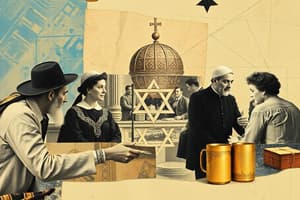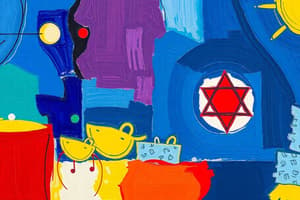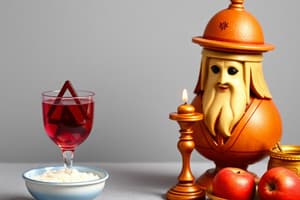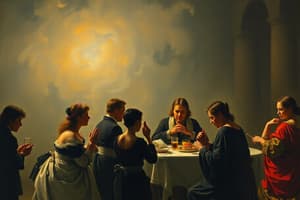Podcast
Questions and Answers
What is Hatarat Nedarim?
What is Hatarat Nedarim?
- A prayer service held at sunset
- The celebration of Rosh Hashana
- The act of giving charity to the poor
- The canceling of all promises and vows (correct)
Why do people perform Hatarat Nedarim before Rosh Hashana?
Why do people perform Hatarat Nedarim before Rosh Hashana?
- It's a serious matter to have promises being broken (correct)
- To welcome the new year joyfully
- To forgive others for their wrongs
- To prepare for the fast of Yom Kippur
What custom is practiced on Erev Rosh Hashana?
What custom is practiced on Erev Rosh Hashana?
- Fasting from dawn until sunset
- Arise early and say selichot (correct)
- Blowing the shofar
- Attending a communal feast
What does the term 'Simana Milta' mean?
What does the term 'Simana Milta' mean?
What is the term for the custom where chicken or money is taken over heads?
What is the term for the custom where chicken or money is taken over heads?
What is the final meal on Erev Yom Kippur called?
What is the final meal on Erev Yom Kippur called?
Why is it important to ask forgiveness from others on Erev Yom Kippur?
Why is it important to ask forgiveness from others on Erev Yom Kippur?
What does the word 'Neila' mean?
What does the word 'Neila' mean?
What are the four things prohibited on Yom Kippur?
What are the four things prohibited on Yom Kippur?
What is the significance of wearing white on Yom Kippur?
What is the significance of wearing white on Yom Kippur?
What happens if someone is considered a Beinoni on Rosh Hashana?
What happens if someone is considered a Beinoni on Rosh Hashana?
What does the custom of Kapparot involve?
What does the custom of Kapparot involve?
Which book is read during Yom Kippur to signify that Hashem accepts Teshuva?
Which book is read during Yom Kippur to signify that Hashem accepts Teshuva?
What is the significance of simanim during Rosh Hashana?
What is the significance of simanim during Rosh Hashana?
Which mitzvah is specifically performed on Erev Yom Kippur?
Which mitzvah is specifically performed on Erev Yom Kippur?
What does one do when they say Vidur?
What does one do when they say Vidur?
What is the extra Shmone Esrei added during Yom Kippur called?
What is the extra Shmone Esrei added during Yom Kippur called?
Why is Rosh Hashana chosen as the day of judgment?
Why is Rosh Hashana chosen as the day of judgment?
What is the name of the final meal before Yom Kippur?
What is the name of the final meal before Yom Kippur?
What does the term 'tzaddikim' refer to in the context of the three books?
What does the term 'tzaddikim' refer to in the context of the three books?
Flashcards are hidden until you start studying
Study Notes
Rosh Hashana
- Hatarat Nedarim: The canceling of all promises and vows.
- Reason for Hatarat Nedarim: It is a serious matter to have promises being broken.
- Custom on Erev Rosh Hashanah: Arise early in the morning and say selichot (penitential prayers).
- Rosh Hashanah as Judgement Day: The day of judgment coincides with the day Adam Harishon (the first human) sinned and was judged.
- The Three Books:
- Tzaddikim (righteous)
- Beinonim (intermediate)
- Reshaim (wicked)
- Beinoni: Someone who is considered to be exactly in the middle in terms of righteousness and wickedness.
- Beinoni's Judgement: Their judgment is postponed until Aseret Yimei Teshuva (the ten days of repentance) and finalized on Yom Kippur.
- Simana Milta: Symbols are real.
- Apples and Challah in Honey: The custom is symbolized by a grandmother who forgot their grandchild's birthday.
Yom Kippur
- Kapparot: A custom where people take a chicken or money over their heads.
- Mitzvah on Erev Yom Kippur: To eat.
- Forgiveness on Erev Yom Kippur: It is crucial to ask forgiveness from others because Hashem only forgives sins between us and people, if those people forgave us.
- Vidur: A prayer recited during the evening service in which one strikes their chest as a sign of repentance.
- Seudat HaMafseket: The final meal on Erev Yom Kippur before the fast begins.
- Four Things Forbidden on Yom Kippur:
- Eating
- Drinking
- Washing
- Annointing oils or creams (or applying)
- Leather Shoes
- Reason to Wear White on Yom Kippur: The white symbolizes purity and cleanliness.
- Kol Nidrei: A prayer recited three times during the Yom Kippur evening service, each time a little louder.
- Neila: The extra Shmone Esrei (Amidah) that we add on Yom Kippur.
- Meaning of "Neila": Closing.
- Reading the Book of Jonah on Yom Kippur: To emphasize that Hashem accepts repentance.
Rosh Hashanah
- Hatarat Nedarim: The canceling of all promises and vows.
- Reason for Hatarat Nedarim before Rosh Hashanah: It's a serious matter to have promises broken, so people cancel them before the High Holidays.
- Erev Rosh Hashanah custom: Arise early and say Selichot.
- Rosh Hashanah as the day of judgement: Adam Ha'Rishon (the first man) sinned and was judged on the same day. This parallels the judgment of all mankind on Rosh Hashanah.
- Three books of judgement: Tzaddikim (righteous), Beinonim (average), Resha'im (wicked)
- Beinoni: Someone whose deeds are exactly balanced - neither particularly good nor bad.
- Beinoni's Judgement: Their judgment is postponed until Aseret Yimei Teshuva (the ten days of repentance) and is finalized on Yom Kippur.
- Simana Milta: A Hebrew expression meaning "symbols are real."
- Apple and Honey: The act of eating apples dipped in honey symbolizes a desire for a sweet New Year.
Yom Kippur
- Kapparot: The custom of taking a chicken or money over one's head to symbolically transfer sins.
- Erev Yom Kippur Mitzvah: To eat.
- Importance of forgiveness on Erev Yom Kippur: Hashem only forgives sins between us and people if those people forgave us.
- Vidur: During Vidur, people pound their chests while asking forgiveness.
- Seudat HaMafseket: The final meal eaten before Yom Kippur.
- Restrictions on Yom Kippur: Eating, drinking, washing, anointing oils or creams, and wearing leather shoes.
- Wearing White on Yom Kippur: Symbolizes purity and cleanliness.
- Kol Nidrei: A prayer recited three times, each time a little louder, on Yom Kippur.
- Neila: The extra Shmoneh Esrei (Amidah) prayer recited on Yom Kippur.
- Meaning of Neila: Closing (referencing the closing of the gates of heaven)
- Reading the Book of Jonah on Yom Kippur: It teaches that Hashem accepts teshuva (repentance).
Studying That Suits You
Use AI to generate personalized quizzes and flashcards to suit your learning preferences.




